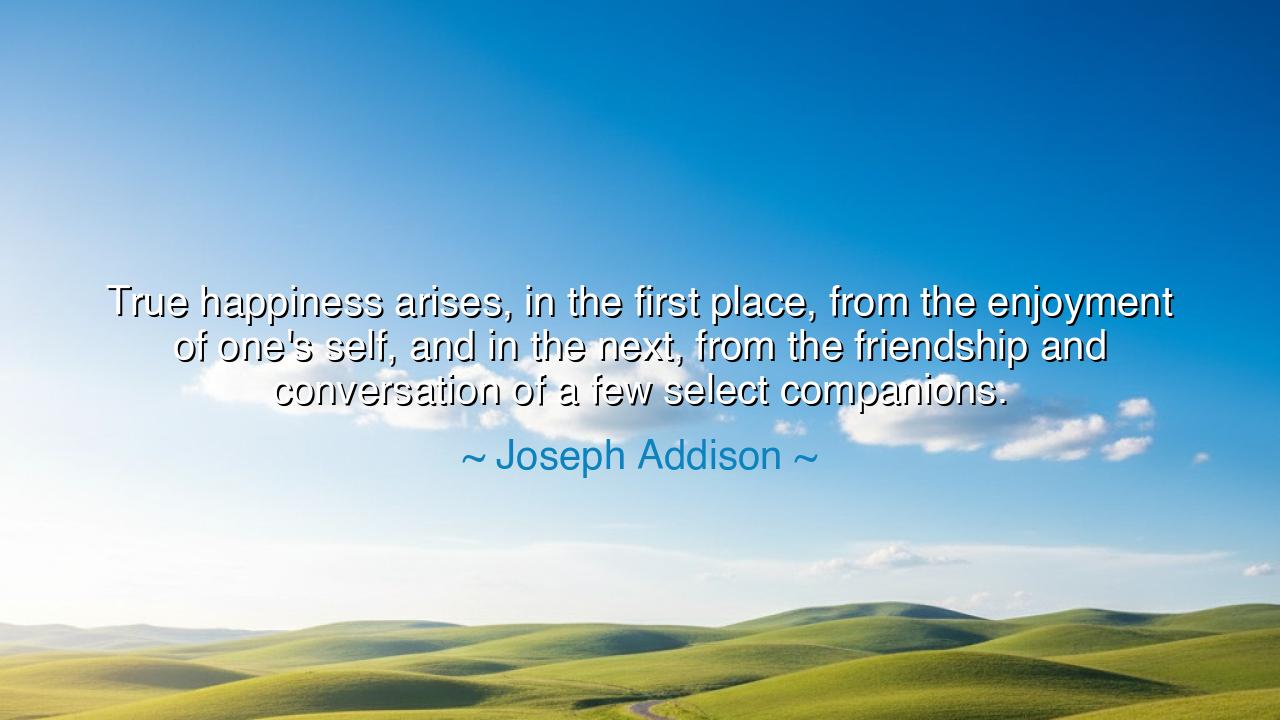
True happiness arises, in the first place, from the enjoyment of
True happiness arises, in the first place, from the enjoyment of one's self, and in the next, from the friendship and conversation of a few select companions.






In the luminous words of Joseph Addison, philosopher of refinement and harmony, we find a truth that resounds across the ages: “True happiness arises, in the first place, from the enjoyment of one’s self, and in the next, from the friendship and conversation of a few select companions.” This saying, simple yet profound, teaches that happiness is not found in the noise of the crowd or in the glitter of wealth, but in two sacred sources — first, the peace within one’s own soul, and second, the companionship of kindred spirits. Addison, who lived in an age of elegance and intellect, knew that joy cannot be chased; it must be cultivated, quietly, through balance, contentment, and fellowship.
In the first part of his teaching, Addison reminds us that self-enjoyment — the ability to be at peace with one’s own heart — is the foundation of all joy. For how can one love others rightly, or find delight in the world, if one is at war within? The ancients called this state eudaimonia — the well-being of the soul — where reason and desire walk in harmony, and the mind is its own serene companion. To enjoy oneself does not mean vanity or self-indulgence; it means possessing a calm spirit, a conscience untroubled, and the strength to draw joy from simple things. As the Stoic Epictetus once said, “No man is free who is not master of himself.” Thus, happiness begins not in circumstance, but in self-mastery — in knowing one’s worth, forgiving one’s faults, and living with inward grace.
The second part of Addison’s wisdom turns outward — to the realm of friendship and conversation. Once a man has found peace within, he must share it with others, for joy kept hidden grows stale. True friendship is the mirror in which one’s own goodness is reflected. Addison speaks of “a few select companions,” for not all company nourishes the soul. The wise do not seek many, but few — those who uplift, challenge, and understand. In conversation, the heart unfolds; through words shared in trust and laughter, life becomes radiant. The philosopher’s solitude becomes humanized by the poet’s warmth, the soldier’s courage, or the friend’s wit. Thus, friendship and dialogue transform contentment into happiness complete — the union of the inward and outward self.
In his own life, Addison embodied this truth. A writer, statesman, and moralist of the early eighteenth century, he lived among the thinkers of the Age of Enlightenment, men who valued wit and wisdom above rank and riches. In his essays for The Spectator, he urged readers to cultivate virtue, moderation, and companionship. His own circle — the poet Alexander Pope, the essayist Richard Steele, and other great minds — became a fellowship of mutual respect and learning. Their gatherings were not mere diversions, but feasts of spirit. Over cups of tea, they shared ideas that shaped an age. Addison understood, as few do, that conversation is the lifeblood of civilization — that through honest words, men refine one another as fire refines gold.
Consider also the example of the philosopher Aristotle and his pupils, who gathered in the shaded walks of the Lyceum. There, under the open sky, they spoke not of ambition or gossip, but of virtue, beauty, and truth. These dialogues, recorded through centuries, gave birth to the foundations of ethics, science, and art. Yet their greatness did not lie in solitary thought, but in companionship — in minds joined by curiosity and friendship. So too did Addison see that happiness, though it begins within, reaches its perfection in community. Man is not made to dwell alone; his joy ripens only when shared.
But there is a warning hidden within Addison’s grace: that those who seek happiness outside themselves will never find it. The man who fills his days with clamor, chasing pleasure or praise, becomes emptier with every triumph. The heart that cannot dwell in its own stillness will always feel restless, no matter the company it keeps. Only when a person learns to enjoy himself — to befriend his own soul — does he gain the capacity to truly enjoy others. From this inward peace flows every outward blessing: patience in adversity, gratitude in prosperity, gentleness in friendship, and laughter in the small hours of life.
Thus, the lesson of this quote is both timeless and practical: learn to be your own companion before you seek others. Take moments of silence to know yourself — your thoughts, your hopes, your faults. Cultivate interests that enrich your spirit, and habits that bring harmony to your mind. Then, seek out a few noble friends — not many — whose hearts resonate with your own. Break bread with them, share conversation that nourishes rather than distracts, and be loyal through both joy and trial. For it is in this balance — inner contentment and outer companionship — that the secret of happiness is found.
So remember, dear listener: happiness is not a prize to be won, but a fire to be kindled. Tend to the flame within — your peace, your self-respect — and it will light the hearth of friendship and fellowship around you. Live as Addison taught: serene in solitude, joyful in company, and grateful in all things. Then shall you know what he called true happiness — not the fleeting pleasure of fortune, but the enduring radiance of a heart at rest, and a circle of friends bound by conversation, trust, and love.






AAdministratorAdministrator
Welcome, honored guests. Please leave a comment, we will respond soon